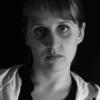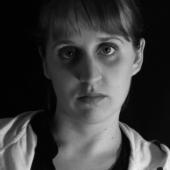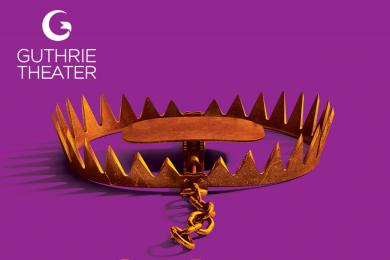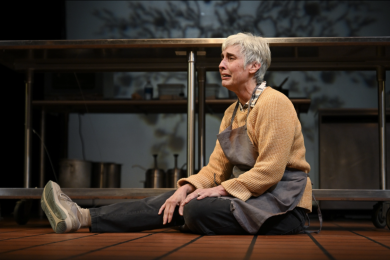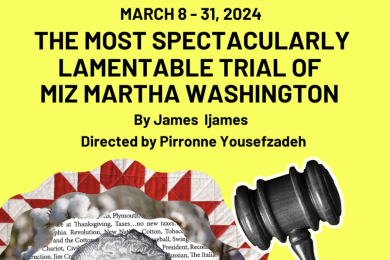Looking Back Into the Void
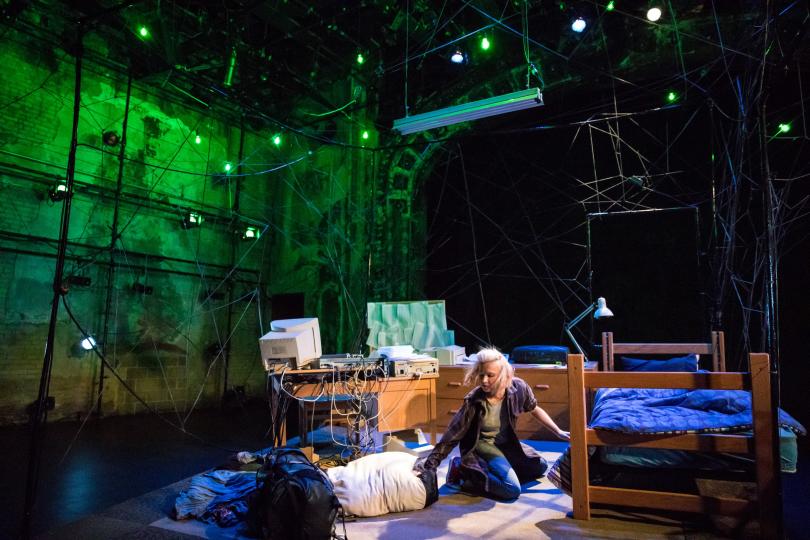
I walked into the Southern Theater to the dulcet tones of Greenday's Basket Case. On stage was a bare bones dorm room with a nest of laundry and pizza boxes surrounding a jungle of cords snaking from the bulky beige boxes of an elaborate personal computer set up. Welcome to 1994.
mONSTER, written by local playwright Sam Graber, follows Nessa (Jamie Fields), an enthusiastic freshman at the University of Maryland, who ends up sharing a room with cagey Brill (Kelsey McMahon) and her sprawling computer set up. But something big is looming out in the “outhouse of the Ivory Tower,” and neither Brill nor philosophical RA Greg (Avi Aharoni) will tell her what's actually going on.
Swandive Theater (which, full disclosure, was co-founded by Minnesota Playlist editor Damon Runnals) has created a very visual striking world. Seán McArdle's set looks less like it was built and more like it was grown, surrounding the dorm room in a tangle or wires like neurons or spider webs. The green glow of the screen is echoed by pulsing light bulbs ensnared in the web around them. It feels like something could be lurking just beyond where we can see, which, of course, it is.
I found myself getting a little frustrated with the exposition. Characters and stakes are established quickly and well. Brill is in the midst of performing some mysterious apocalyptic task, and even though Nessa wants her to blow it off and go to parties, we as an audience know that a terrible idea. While we learn that her cryptic cycles are to “keep the world from going berserk,” I don't know that I got a clear sense of what she was doing, or what she thought “berserk” could mean.
Part of it is likely me. I was nowhere near the internet in 1994, and I would have liked to have a better understanding about what it looked like, what it could do, what people wanted it to do. The play has some fun looking forward into the possibilities of the internet we are currently enmeshed in (and you're reading this on), like when Brill places an order on a restaurant website. Nessa gasps, “You can get a pizza from a computer?”
But, you can get a lot more than just pizza. The titular mONSTER is waiting there too. Graber has a way with visceral language, and all three characters have moments when they lift out of speech into something more like poetry. They paint a vivid, distressing picture. We know what the monster feels like. But I'm not sure I know what it is.
The production answers this question with a video montage that accompanies the eventual accidental release of the creature, combining flashes of hateful images and memes and stats about social media and Facebook use. It shows us the mONSTER in 2017, a creature I think we're all familiar with at this point, but I wanted to know what it looked like at birth, in 1994. The specificity, for me, made the monster smaller.
And this is a show with some big ideas. Nessa makes maps, representations of physical space, which are in some ways the quaint opposite of the nebulous internet. “What is more human than a map?” they ask. Greg is also concerned with mapping, fretting that a society is on the verge of transforming without the guidance of a clear moral code.
Nessa does a lot of the heavy lifting story-wise as Brill doesn't talk much and Greg speaks in waterfalls of dense ideology. I found myself frustrated that her questions weren't being answered, because they were the same questions I had. Once all the cards were out on the table and the characters were able to really connect, I found myself hooked back in to the story, and the roommates' relationship felt earned and important.
In the end, I think the production may spend too much time in 2017 and not quite enough in 1994. We know that the mONSTER escapes, we've seen the wide, destructive shadow it casts. But, seeing these people try to find it, and try to fight it still feels very relevant. It's a bold play that reaches into your guts and the kind of work more theaters around town should be seeking out.
